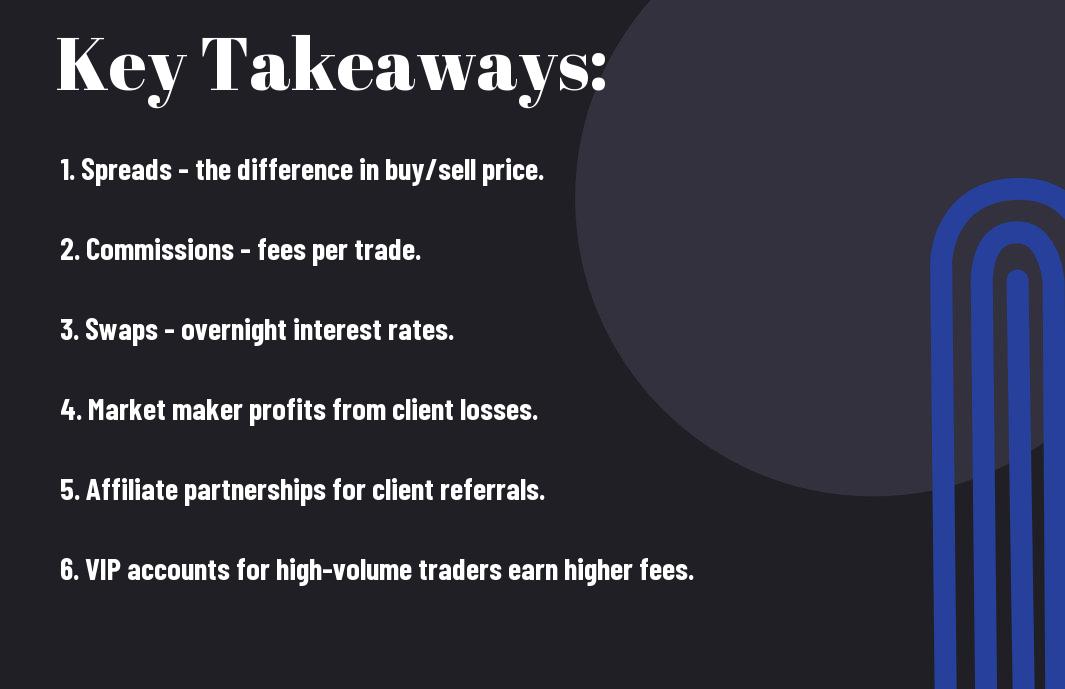Most traders in the forex market are aware that forex brokers play a crucial role in facilitating their trades. However, have you ever wondered how these brokers actually make money? Understanding the revenue sources of forex brokers is imperative for traders to make informed decisions. In this blog post, we will examine into the most important ways forex brokers generate income, the potential dangers that traders should be aware of, and the positives of working with reputable brokers in the industry.
Key Takeaways:
- Spread: Forex brokers make money through the spread, which is the difference between the buying and selling prices of currency pairs.
- Commission: Some forex brokers charge a commission on trades, in addition to the spread, as a way to generate revenue.
- Interest: Brokers may also earn money through interest payments on leveraged positions held by traders overnight.

Revenue Models for Forex Brokers
Spread Charging
Any forex broker makes money through spread charging, which is the difference between the buy and sell price of a currency pair. The broker will quote a slightly higher price when selling and a slightly lower price when buying. This difference is where they generate their profit. It is important for traders to be aware of the spread as it directly impacts their trading costs.
Commission Fees
Forex brokers also earn revenue through commission fees. Anytime a trade is placed, the broker charges a small fee for facilitating the transaction. This fee can be a fixed amount or a percentage of the trade volume. Some brokers offer commission-free trading but compensate by widening the spread.
The commission fees charged by brokers can vary significantly and traders should pay close attention to this cost. While some brokers have low commission fees, others may have higher charges that can eat into profits. It is important to calculate how these fees will impact your overall trading performance.
Brokerage Services and Additional Earnings
Swaps and Overnight Financing Fees
One way forex brokers make money is through swaps and overnight financing fees. When traders hold positions overnight, they may incur fees for the overnight use of leverage provided by the broker. These fees are calculated based on the interest rate differential between the two currencies being traded. While these fees may seem small, they can add up over time and impact a trader’s overall profitability.
Account Management and Inactivity Fees
An additional source of revenue for forex brokers is through account management and inactivity fees. Some brokers charge fees for managing a trader’s account, such as processing withdrawals or providing additional services. Inactivity fees are charged when an account has been dormant for a certain period of time. It’s important for traders to be aware of these fees and how they can affect their trading account.
Account management and inactivity fees can eat into a trader’s profits if they are not actively monitoring their account. Traders should carefully review a broker’s fee structure before opening an account to fully understand the costs involved. While these fees are a common practice in the industry, traders should ensure they are getting sufficient value from their broker to justify any fees incurred.
Risk Management and Profitability Strategies
Broker Position and Market Making
Now, let’s investigate into how forex brokers manage risk and implement profitability strategies. An imperative aspect of a broker’s revenue stream comes from market making, where they take the opposite side of their clients’ trades. By doing so, brokers can profit from the spread and any potential losses incurred by traders.
Risk Hedging and Diversification
Now, let’s discuss another crucial element of risk management for forex brokers – risk hedging and diversification. Any reputable broker understands the importance of minimizing exposure to market volatility by hedging their positions. By offsetting potential losses in one trade with gains in another, brokers can protect their profitability and maintain stability.
Broker’s utilize various hedging strategies such as utilizing options, futures, and other financial instruments to mitigate risks associated with currency fluctuations. Diversification across a range of currency pairs and markets also plays a key role in managing risk effectively.
Ethical Considerations and Regulatory Compliance
Preventing Conflicts of Interest
Despite the competitive and lucrative nature of the forex industry, ethical considerations must be paramount for brokers to maintain trust and integrity within the market. An vital aspect of ethical behavior is preventing conflicts of interest, where brokers must ensure that their profits do not come at the expense of their clients’ success.
Regulatory Oversight and Customer Protection
To operate in the forex market, brokers must adhere to strict regulatory guidelines set by authorities such as the Securities and Exchange Commission (SEC) and the Commodity Futures Trading Commission (CFTC). These regulations are in place to protect customers from fraudulent activities and ensure the fair and transparent operation of the market.
For instance, regulatory oversight mandates that brokers keep client funds segregated from the company’s operational funds, ensuring that in the event of bankruptcy, clients’ funds are protected. Additionally, brokers are required to provide clear and accurate information about the risks involved in forex trading, as well as disclose any potential conflicts of interest that may arise during their interactions with clients.
To wrap up
Presently, forex brokers make money through various ways such as spreads, commissions, and swaps. They act as intermediaries between traders and the interbank market, enabling individuals to participate in the currency trading market. By offering leverage and liquidity to traders, forex brokers create opportunities for profit while also effectively managing risks. Understanding how forex brokers make money is crucial for traders to make informed decisions and navigate the complexities of the foreign exchange market effectively.
FAQ
Q: How do forex brokers make money?
A: Forex brokers make money through spreads, commissions, and swaps. Spreads are the difference between the buy and sell price of a currency pair. Commissions are fees charged on each trade, either a fixed amount or a percentage of the trade value. Swaps are interest payments or credits for holding positions overnight. Additionally, some brokers may earn from providing leverage to traders.
Q: What is a spread and how does it affect a trader’s profitability?
A: A spread is the primary way forex brokers make money. It is the difference between the bid (sell) price and the ask (buy) price of a currency pair. The spread represents the broker’s fee for executing trades. A wider spread means higher costs for the trader, making it more challenging to be profitable. It is crucial for traders to consider the spread when choosing a broker.
Q: Are there other ways forex brokers make money besides spreads?
A: In addition to spreads, forex brokers may also charge commissions on trades. Commissions can be a fixed fee per trade or a percentage of the trade value. Brokers may also earn from swaps, which are interest rate differentials on currency pairs held overnight. Some brokers offer additional services or products such as managed accounts, educational resources, or premium trading tools for which they charge fees.
